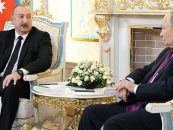By Alika Guchua
The South Caucasus region was, is, and most likely will remain a crossroads of geopolitical, geostrategic and geo-economic interests for global players. The three states in the South Caucasus – Georgia, Azerbaijan and Armenia, despite their long neighborhood history, represent ethnically, religiously and ideologically different states, with different cultures and worldviews.
The 2020 war between Azerbaijan and Armenia in Nagorno-Karabakh and the Russia-Ukraine war that started on February 24, 2022 and continues to this day have made clear the relevance of threats and challenges in the South Caucasus. Especially in geopolitical and geo-economic terms.
It must be said that from the geostrategic point of view, such outlines of the development of events can be seen, which lead to the redistribution of the spheres of influence of the important strategic players in the region. All this in itself will create a new reality for the countries in the South Caucasus region, which is likely to be fraught with challenges.
The Russia-Ukraine war, which continues to this day, will remain an important event for world history. In this war, the use of modern military technologies, the application of new approaches and tactics in combat operations are being actively implemented. In order for Ukraine to preserve its independence and sovereignty, it is necessary to actively support and cooperate with the West. We all know that military operations require huge military, financial and human resources, which Ukraine does not have without the support of the West. However, it must be said that the Ukrainians are preparing certain military technologies themselves, but the support of the West is also important here.
The Russia-Ukraine war had a significant impact on various events in the world, starting from the security of energy resources and ending with grain or food security.
It is important what impact this war had on all three states of the South Caucasus – Azerbaijan, Georgia and Armenia. Russia’s invasion of Ukraine exposed Russia’s weaknesses, which raises the prospect of strengthening the West’s position in the South Caucasus and promotes the transformation of the South Caucasus itself into a more independent and attractive region. It should also be noted that the countries of the South Caucasus have different foreign policies and tactics in international relations. The mentioned war led to certain changes in the South Caucasus from a geopolitical point of view.
Today, Russia is relatively weaker than before the start of the war, and this process of weakening Russia is taking place more and more actively. This also means the weakening of its positions in the South Caucasus region. In the 2020 Karabakh conflict, Russia’s weak positions were also clearly visible. Russia is no longer an exclusive actor and arbiter in this region.
As a result of this war, Russia’s positions in Armenia weakened, which is due to great disappointment, because Armenia had great hopes for Russian support. Russia has to pursue a policy of strategic balance as much as possible in order to maintain certain levers of influence in Armenia, while the interests of the West and China in the South Caucasus region are growing.
In the contemporary period, Azerbaijan is taking bolder, more independent and daring steps in the direction of foreign policy. All this is due to its national interests and is correct. It is becoming a sharper geopolitical actor in the South Caucasus region. It should be noted here that the role of the region emerges as a potentially independent region, where Russia’s role and power is slowly weakening.
As for Georgia, it tries to maintain the transit function, because its role should be aimed at maintaining peace in Regina. It is a tolerable fact that the leaders of Azerbaijan and Armenia are meeting in Brussels and that they are trying to get rid of Russia’s influence, this is a certain window of opportunity for them. We should also draw attention to the fact that the attitudes towards Russia are changing in these countries and are increasingly leaning towards the West. Which means to increase their development, overall well-being and safety.
In order to acquire the status of a potentially independent region, the countries of the South Caucasus should implement the right strategy through joint cooperation and pragmatic policies. All this will give them the opportunity to escape from the influence of external actors to some extent. Accordingly, what kind of processes will develop in the South Caucasus region depends on many factors and centers of influence, such as China, Turkey, Russia, the USA and the European Union, which requires the implementation of complex policies by the countries of the South Caucasus region in order not to harm their national interests. Through cooperation, the leaders of all three states of the South Caucasus should determine what role and place the South Caucasus region should have in the future, so that it becomes safer and more peaceful.






